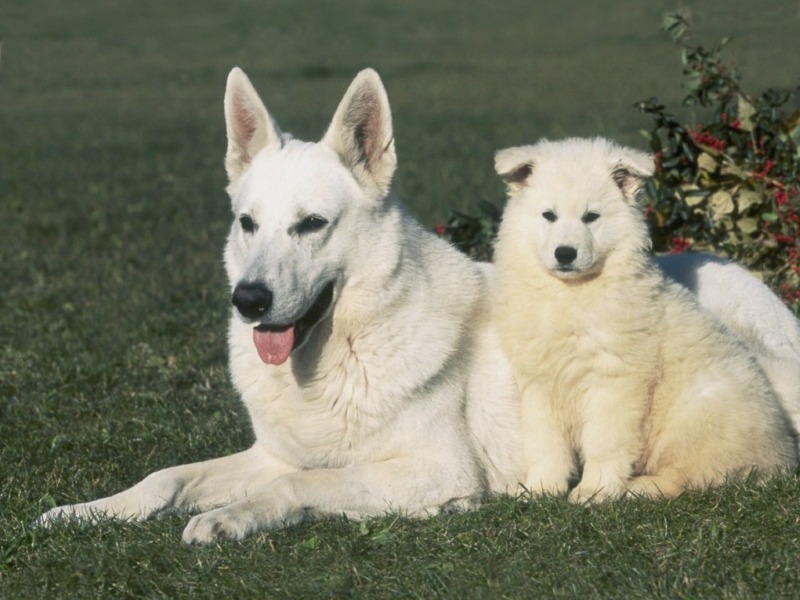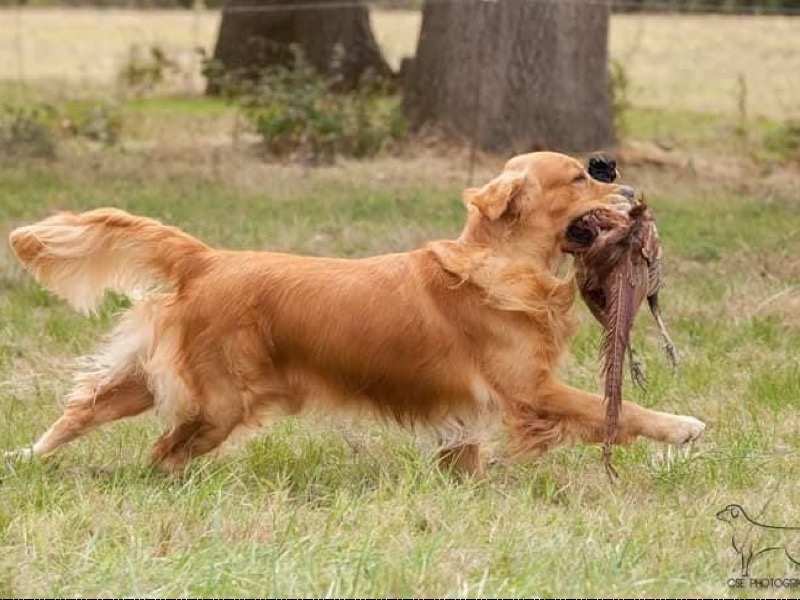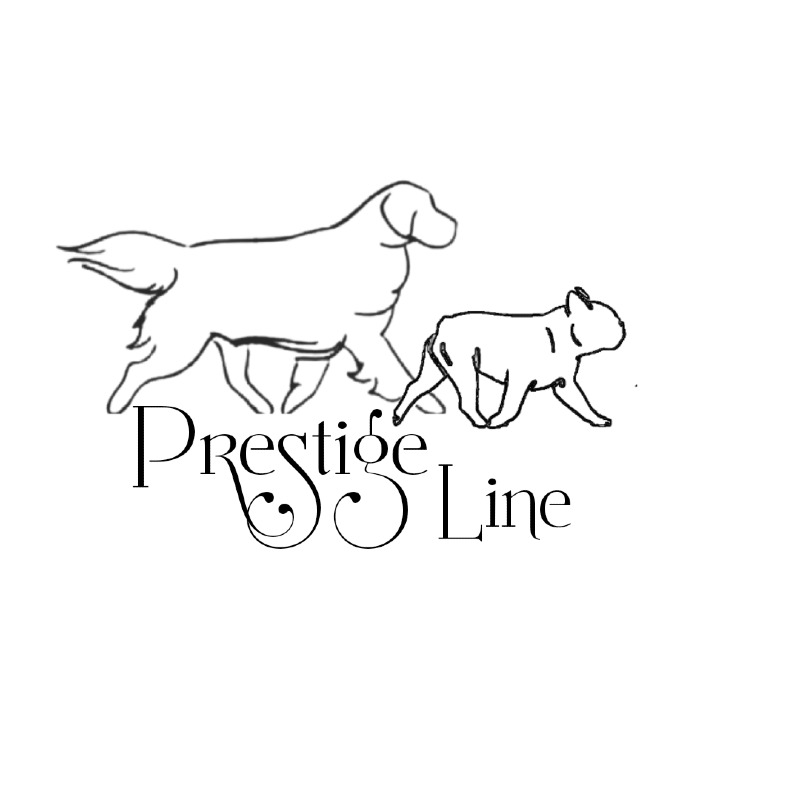Golden retriever
Autres noms : Flat-coated retriever, Golden, Yellow, Golden retriever
Discover the Golden Retriever, a loyal and intelligent dog, valued for its friendly nature and excellent temperament. A perfect family companion, it excels in learning and thrives on exercise and social interactions.
Awareness of acquiring an animal
Adopting or breeding a dog is a responsibility that must be carefully considered. Dogs are loyal companions that require time, attention, and constant care. Whether for leisure, passion, or professional breeding, it is crucial to understand the specific needs of each breed. Provide them with a loving and stimulating environment, and avoid any impulsive acquisition that could harm their well-being. Be a vigilant and committed owner for a happy and healthy companion.
To learn more about animal welfare, we invite you to consult our FAQ by clicking the button below:
Origins and history
The golden retriever is a breed of dog that originated in the United Kingdom, developed in the 19th century to meet the needs of hunters. The breeding of these dogs began in the Scottish regions, where hunters required a companion capable of retrieving game on land and in water. To create this breed, breeders crossed several breeds, including retriever-type hunting dogs and local breeds.
One of the main contributors to the development of the breed is Sir Dudley Majoribanks, who began his breeding efforts in the 1860s. His goal was to produce a dog that was both an excellent game retriever and a good companion. In 1913, the golden retriever was officially recognized by the British Kennel Club, further boosting its popularity.
The golden retriever is valued for its intelligence, gentleness, and friendly temperament. These traits make it not only an excellent hunting dog but also a pet and assistance dog in various fields, including therapy and rescue. Over the decades, the breed has gained popularity worldwide, becoming one of the most sought-after and beloved breeds.
Physical characteristics
The golden retriever is a medium to large dog, renowned for its elegant appearance and friendly temperament. Generally, males stand between 60 and 65 cm at the withers and weigh between 29 and 34 kg, while females are slightly smaller, measuring about 55 to 60 cm and weighing between 25 and 32 kg. This size difference is consistent with the typical morphology of the breed, which features an athletic and well-proportioned body.
The coat is one of the most remarkable characteristics of this breed. It is dense, water-repellent, and can vary in color from light blonde to dark golden. The fur consists of two layers: a soft, insulating undercoat and a longer, outer coat that is straight or slightly wavy. This allows the dog to adapt to various climatic conditions and gives it a certain water resistance.
The head is broad with a well-developed skull, and the eyes, which are a dark brown color, are expressive and reflect the intelligence and gentleness of this breed. The ears are of medium size, hanging close to the cheeks, which harmonizes the face. The tail, which is usually well-furnished with hair, is often carried joyfully, indicating the playful and affectionate nature of the golden retriever.
Character
The golden retriever is a dog with a balanced and friendly temperament. It is a loyal companion known for its sociability. This trait makes it an excellent pet, able to adapt to various environments, whether urban or rural. Its positive attitude and desire to please make it a beloved partner for families, from children to elderly people.
The intelligence of the golden retriever is remarkable. This breed learns quickly and is often used in assistance and work missions, such as search and rescue dogs. Its ability to understand and execute commands makes it a diligent student during training sessions. Its loyalty to its owner is also a fundamental aspect of its character.
Finally, the energy of the golden retriever should not be underestimated. This dog needs daily exercise and loves outdoor activities, such as walks and playing in the water. This vitality, combined with its kindness and intelligence, makes it an ideal companion for those seeking an active and affectionate pet. In summary, its character makes it a loved and appreciated animal in households around the world.
Life expectancy
The life expectancy of a dog breed like the golden retriever generally ranges between 10 and 12 years. However, this average can vary depending on several factors, including genetics, health, and living conditions. Many dogs of this breed can live beyond 12 years if they receive a good diet, regular exercise, and appropriate veterinary care.
It is essential to consider the predispositions to certain hereditary diseases that can affect this breed. Golden retrievers are often prone to health issues such as hip dysplasia, heart diseases, and various types of cancer. Regular veterinary check-ups can help prevent or detect these problems early, which can then improve both the quality and length of life.
Furthermore, a balanced lifestyle is crucial for maximizing life expectancy. A suitable diet, rich in nutrients, combined with sufficient physical activity, also contributes to the longevity of these dogs. By taking care of these aspects, owners can not only increase their companion's years of life but also ensure their overall well-being.
Exercise and activity needs
Golden Retrievers are active and energetic dogs that require a regular level of exercise to maintain their physical and mental health. A daily need of about one hour of activity is recommended, which can include walks, interactive games, or training sessions. These activities help them expend their energy, thereby reducing undesirable behaviors such as anxiety or destructiveness.
Walks are essential to stimulate their curiosity. It is advisable to vary the routes and introduce new environments to enrich their experience. Games such as frisbee or fetch also contribute to their well-being by channeling their retrieving instinct.
Additionally, this breed particularly enjoys family activities, strengthening the bonds with their owners. Canine sports, such as agility or obedience competitions, can be an excellent way to engage them mentally while providing physical exercise. Therefore, a mental challenge, combined with physical exercise, is essential for their development.
Recommended diet
The diet of a golden retriever must be balanced and tailored to their specific needs, taking into account their age, weight, and activity level. It is crucial to choose high-quality kibble that is rich in animal protein to support muscle mass and overall health. Proteins from sources such as chicken, beef, or fish are particularly beneficial.
Fats also play an essential role in the diet of this breed. They provide the necessary energy for physical activities and contribute to the health of the skin and coat. Omega-3 and omega-6 fatty acids, found in ingredients like fish or flaxseed oils, are especially recommended.
Carbohydrates should be selected carefully. Vegetables, fruits, and whole grains can provide essential fiber and nutrients while maintaining good digestion. It is best to avoid products containing unnecessary fillers or meat by-products.
Finally, it is important to monitor portion sizes and keep an eye on the dog's weight to prevent obesity, which is common in this breed. Properly portioned meals, divided into two meals per day, will help maintain optimal health. Consulting a veterinarian to establish a specific diet plan is also advisable.
Training and obedience
Training and educating a golden retriever requires a positive and consistent approach. This breed is known for its gentleness and intelligence, making it an excellent candidate for obedience. It is essential to start training at a young age, incorporating socialization sessions where the puppy can meet other animals and people. This helps develop a balanced and self-confident temperament.
Methods based on positive reinforcement are particularly effective. Rewarding desired behaviors with treats or affection encourages the animal to repeat those actions. It's important to be patient and to avoid using punitive methods, as this can lead to anxiety and problematic behavior.
Exercise and social interaction are also crucial. Golden retrievers need plenty of physical activity to stay healthy and happy. Fetch games, regular walks, and training sessions contribute to their mental and physical well-being. By incorporating these elements, it is possible to raise a balanced and well-educated companion.
Behavior with children
The behavior of Golden Retrievers with children is generally very positive. These dogs are known for their friendly, gentle, and sociable nature. Their temperament makes them particularly suitable for families with children. They are often very patient and tolerant, which is essential when interacting with young ones. Golden Retrievers love to play and are full of energy, creating moments of bonding and joy within the family.
Furthermore, these dogs are known for their strong sense of emotion, allowing them to adapt to the mood of children. They can sense when a child is sad or angry and respond in a comforting manner. This makes them ideal companions for children, as they provide emotional support while being enthusiastic playmates.
However, it is important to ensure proper socialization from an early age. Balanced training and supervision during interactions with children guarantee a positive experience. Golden Retrievers, although naturally caring, benefit from guidance to ensure respectful and safe interactions. In summary, their behavior with children makes them loyal and friendly allies within households.
Compatibility with Other Animals
The golden retriever is known for its friendly and social nature, making it an excellent choice for households with other pets. This breed generally has a gentle and tolerant disposition, promoting a harmonious environment. Due to their balanced temperament, these dogs often get along well with other dog breeds, as well as with cats.
When introducing a golden retriever into a home that already has other animals, it is important to proceed with gradual socialization. This involves introducing the animals in a neutral space and supervising their initial interactions. Golden retrievers are characterized by their curiosity and desire to play, which can help establish strong bonds with other animals, provided that these animals are also receptive to their friendly approach.
However, each animal has its unique personality. Some may be reserved or hesitant toward newcomers, which may require an adjustment period. In general, thanks to their compassionate nature and ability to learn, golden retrievers can peacefully coexist with other pets, making their integration into a multi-pet household quite feasible.
Grooming needs
Grooming and maintenance of a golden retriever are essential to maintaining their health and well-being. This breed has a dense, water-resistant coat consisting of two layers: a soft undercoat and a longer, smoother outer coat. Regular brushing, ideally two to three times a week, is necessary to prevent mats and reduce shedding. During shedding periods, which typically occur in spring and autumn, daily brushing is recommended.
In addition to brushing, it's important to regularly check the ears, as golden retrievers are prone to ear infections. Weekly ear cleaning can help prevent these issues. Teeth should also be cared for by regular brushing to avoid dental problems, and nails must be trimmed if they don't naturally wear down during walks.
Finally, a bath every four to six weeks is recommended to keep the coat clean and fresh. It is crucial to use appropriate shampoos and rinse thoroughly to preserve the quality of the coat. By following these grooming recommendations, owners can ensure that their golden retriever remains in excellent health and maintains a well-groomed appearance.
Health
The golden retriever is a popular dog breed, appreciated for its friendly nature and intelligence. However, it is essential to consider certain aspects related to its health. This breed is prone to several hereditary health issues, which requires special attention from owners.
One of the major concerns is hip dysplasia. This condition, caused by abnormal formation of the hip joint, can lead to pain and decreased mobility. Regular check-ups and selecting dogs from healthy lines are crucial to minimize this risk.
Golden retrievers are also prone to certain types of cancers, including lymphoma and bone tumors. Early detection is fundamental to improve treatment chances. Regular veterinary visits and careful monitoring of abnormal behaviors can help identify these issues.
Additionally, heart disorders and eye problems such as cataracts can also affect the health of this breed. Providing a balanced diet, regular exercise, and veterinary follow-up are essential measures to ensure a long and healthy life. Ultimately, a shared responsibility between the owner and the veterinarian is crucial to prevent these health problems.
Environment and habitat
The golden retriever is a dog breed that adapts well to various environments but thrives particularly in family settings. This sociable dog needs regular contact with its owners and can suffer from isolation. Therefore, it is advisable to keep it in households where it receives sufficient attention. Access to a garden or outdoor space is beneficial, as it allows the dog to expend both physical and mental energy.
In terms of its habitat, this dog requires daily exercise, ideally at least an hour of walking or active play. Activities such as swimming or retrieving games are particularly suitable for its natural instincts. The breed enjoys the company of other dogs and pets, which can positively influence its behavior. A stimulating environment, including interactive toys and varied activities, is essential for maintaining its joy of life and health.
Finally, a calm and safe habitat is crucial for the well-being of the golden retriever, as it can be sensitive to loud noises and stressful situations. It is also recommended to provide a comfortable space for rest, as well as a balanced diet that meets its energy needs.
Name ideas
Choosing a name for a golden retriever is an important step that reflects not only the personality of the animal but also that of its owner. A good name should be short, easy to pronounce, and memorable. Favor clear sounds that attract your dog's attention, and avoid names that are too long or complicated.
It is also important to consider your golden retriever's appearance and character. These dogs are often friendly, affectionate, and full of energy. A name that evokes these personality traits can create a stronger bond between you and your companion. Also, think about how the name sounds; some names lend themselves better to calling from a distance without being too loud.
Here are some suggestions that might suit a golden retriever: Sunny, Bella, Max, Charlie, Daisy, Buddy, Goldie, Luna, Jasper, Kira, Oliver, Ruby, Milo, Nala, and Leo. These names combine simplicity with an affinity for the joyful and playful nature of the breed. Take the time to think it over and choose the one that makes you smile every time you call it!
Average purchase price
The acquisition of a purebred golden retriever involves a variety of costs that can vary significantly based on several factors. Generally, the price of a puppy from a professional breeder ranges from 800 to 2000 euros. This amount can fluctuate depending on the breeder's reputation, the dog's lineage, and compliance with breed standards.
Initial costs do not stop at the purchase. It's important to account for expenses related to vaccinations, spaying/neutering, microchipping, and initial veterinary care. These expenses can add several hundred euros more. Additionally, purchasing essential supplies such as a collar, leash, kennel, and toys should also be included in the budget.
In the long term, the cost of owning a golden retriever includes food, regular veterinary care, grooming, and potential training. Overall, owning a dog of this breed entails a significant financial investment, but it also brings immense satisfaction and a long-term responsibility.
Expenses
Owning a golden retriever involves various and regular expenses. On average, the monthly budget for an adult dog can amount to around 80 to 150 euros. This amount mainly includes food, which is one of the primary expenses. Quality food for this breed can cost between 50 and 80 euros per month.
Furthermore, veterinary expenses should be considered. Annual visits for vaccinations and health check-ups can represent about 150 to 200 euros, which translates to roughly 12 to 17 euros per month. It is also important to budget for preventive care expenses, such as parasite treatments, which can add an additional 10 to 20 euros monthly.
In addition, grooming expenses, such as periodic grooming, should be factored in. This can reach 20 to 40 euros every two to three months, or about 10 to 15 euros per month. Toys, basic equipment, health insurance, and occasional pet-sitting costs should also be taken into account, which can easily raise the monthly costs to over 150 euros when everything is included.
In summary, the total budget varies depending on many factors, but it is crucial to plan these expenses well to ensure the well-being of your pet.
Destination and usage
The golden retriever is a highly valued dog breed as a pet, known for its friendly nature and intelligence. These dogs easily adapt to various family environments, whether in houses with gardens or apartments. Their sociable temperament makes them particularly suitable for living with children, making them excellent companions for families. They are often described as affectionate and loyal, fostering strong bonds with their owners.
These dogs are also used to encourage physical activity and the psychological well-being of family members. They enjoy participating in activities such as walks, playing fetch, and even swimming. Their need for regular exercise often prompts owners to adopt a more active lifestyle, enhancing family interactions.
Finally, their gentle nature and ability to socialize make them well-suited as therapy dogs. In this role, they provide comfort and emotional support to individuals in settings such as hospitals or nursing homes. In summary, they are ideal pets for those seeking a loyal, joyful, and active companion.
Legislation and regulation
The legislation and regulations concerning breed-specific dogs, including the golden retriever, vary significantly from country to country. In some countries, such as the United States, there is no specific legislative framework in place to prohibit or restrict the ownership of this breed. Laws regarding pets generally focus on animal welfare and owner responsibility.
In Europe, several countries have stricter regulations. For example, some states impose requirements for registration and vaccination, as well as specific conditions related to breeding and selling. Additionally, some countries recognize the importance of socialization and training for dogs, which can positively influence the behavior of golden retrievers in public spaces.
In other regions, laws may target dogs deemed dangerous, but golden retrievers are rarely included in these categories. Thus, most regulations emphasize owner responsibility and ethical care practices, promoting a healthy environment for these animals.
Official recognition
The official recognition of the golden retriever breed varies from country to country, but overall, it is widely accepted and encouraged in many nations. This breed is often recognized by major dog and canine organizations, which facilitates its participation in competitions, shows, and breeding-related activities.
In European countries like France and the United Kingdom, golden retrievers are frequently bred and shown at dog shows. Breed club regulations ensure that quality standards are maintained in terms of health and temperament. In North America, particularly in the United States and Canada, this breed is also popular, enjoying full recognition from national breed organizations.
In some Asian countries, recognition may be less formal; however, the popularity of this breed is clearly on the rise. Local breeders strive to comply with international standards. Nonetheless, disparities exist in the management of adopters and the monitoring of animal health in certain regions. Thus, while widely recognized, the level of attention given to this breed depends on local breeding practices and infrastructures.
Pedigrees
To obtain a pedigree for a golden retriever, it is essential to contact recognized canine organizations that manage breed registrations. Among the major federations, the Fédération Cynologique Internationale (FCI) is an international authority that ensures the recognition of dog breeds and the issuance of compliant pedigrees for these animals. Each country may have its own organization affiliated with the FCI, which registers dogs and issues the appropriate documents.
In France, for example, the Société Centrale Canine (SCC) is the main organization responsible for breed dog registrations. The SCC oversees the issuance of pedigrees and ensures that breeders adhere to breed standards. Golden retriever breeders must be members of this organization in order to register their litters and obtain pedigrees for their puppies.
Other specialized clubs also exist, such as the Club Français du Golden Retriever (CFGR), which provides resources, advice, and information to breeders and owners. These clubs promote the preservation of breed characteristics and organize events, exhibitions, and training, but they do not issue pedigrees as such. They collaborate with organizations like the SCC to manage official registrations and promote the breed.
Therefore, it is important for golden retriever owners and breeders to inquire with these organizations to ensure that their animals are properly registered and have all the necessary certifications.
Prohibitions
Restrictions regarding certain dog breeds vary significantly from country to country. In most jurisdictions, laws concerning specific breeds typically focus on dogs considered dangerous. Golden retrievers, on the other hand, are not part of these often regulated or banned breed classifications. Viewed as friendly and sociable, these dogs are often the opposite of the prejudices that may affect certain other breeds.
In several countries, legislation prohibits ownership or imposes restrictions on certain breeds, often based on bite incidents. However, golden retrievers are widely accepted, and their playful temperament often makes them good companions for families. In France, for example, the legislation primarily applies to dogs deemed dangerous, which does not include this breed.
Internationally, many shelters and organizations specifically recommend this breed, given its gentle nature and ability to fit into various family situations. Thus, around the world, golden retrievers are rarely associated with bans, highlighting their popularity and positive perception in society.
Breeders of Golden retriever
Want to see more breeders of Golden retriever?
Check out the page of our directory listing all breeders of Golden retrieverClassified Ads of golden retriever
No of golden retriever classified ads are available on Preeders.
If you’re a breeder, sign up for free now and be the first to post a classified ad
Breed clubs of golden retriever
No of golden retriever breed clubs are currently registered on Preeders.
If you would like to highlight your breed club, sign up for free now and be the first to appear on this page.









